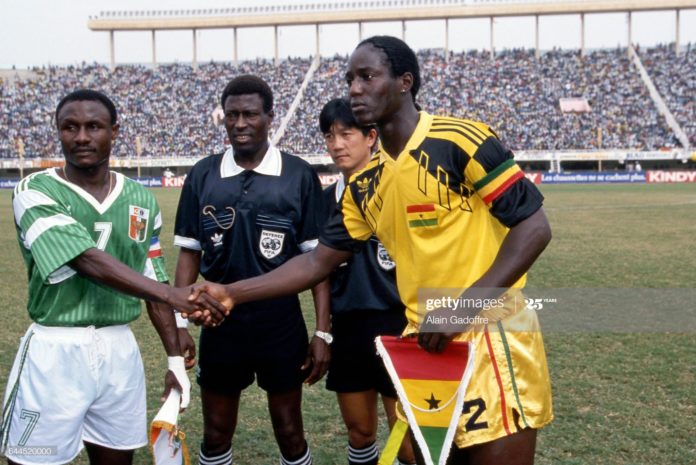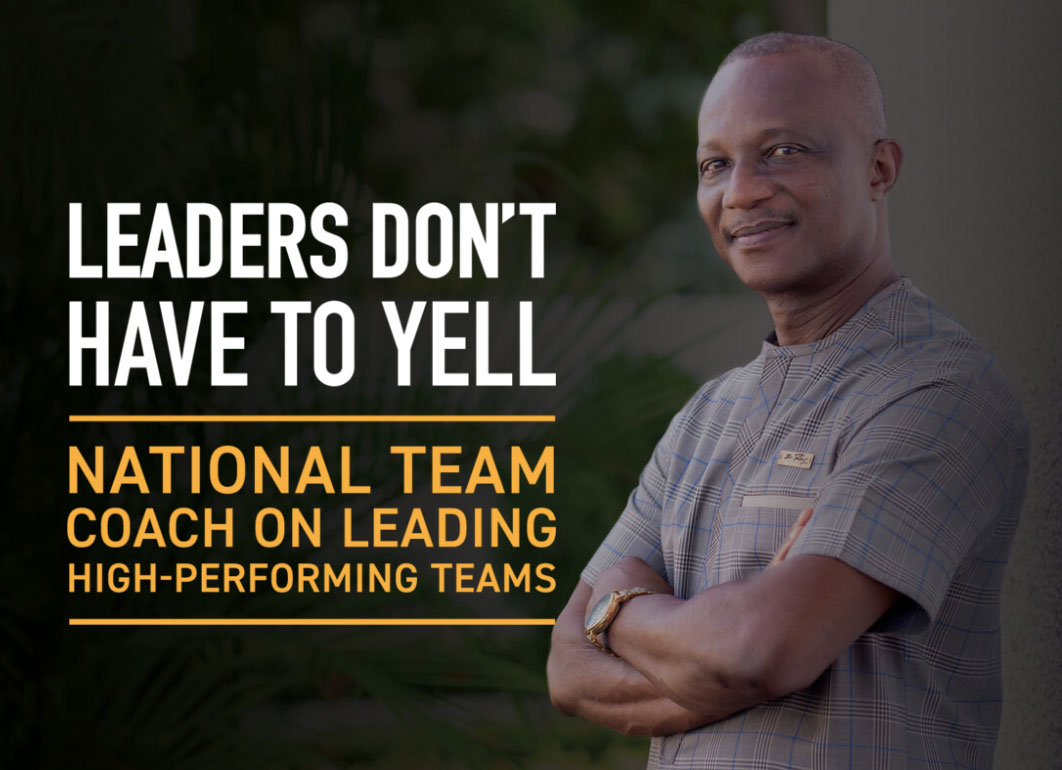
|
Getting your Trinity Audio player ready...
|
I’m 27 now — almost 28 — and I’ve seen Ghana play, and lose, two finals in the quest to secure that elusive fifth Africa Cup of Nations title.
Both defeats — 1-0 to Egypt in 2010, and a shootout heartbreak against Cote d’Ivoire five years later — hurt badly, yet Ghanaians of an older generation could almost swear by a certain Germany-born Ghana international’s boot that they’d seen worse: an episode that played out some 11 months before my birth, and a memory the nation has sought to banish and bury deep under many more nightmares that the Black Stars have suffered in the ensuing years. And maybe that might have worked had Ghana’s pain in that lost Afcon final — also versus our Ivorian neighbors, also on penalties — started and ended with captain Anthony Baffoe’s saved kick.

Ah, that word: captain . . .
It has lit a fire in the modern history of the Ghana national team, and it certainly did in the run-up to that final, and, in fact, before the tournament itself. See, Baffoe shouldn’t have had the armband strapped to his biceps on that fateful occasion. Somehow, though, such a weighty responsibility was thrust on him, following a strange sequence of events.
First, the captaincy was taken off Kwasi Appiah — for wholly farcical reasons you’ve probably heard of, and which he explains in some detail in Chapter 10 of his recently released memoir, Leaders Don’t Have To Yell — and handed to Abedi Ayew, a man with whom he shared a Ghana debut a decade prior.
“After one of our training sessions during our pre-tournament camping in Accra, some members of the GFA management team and the coach called me into a meeting,” Appiah recollects.
“They informed me that since the tournament was going to be in a French-speaking country, and I did not speak or understand French, it was better that a player who understood French captained the team.”
Enter Ayew, ponytailed star of France’s Olympique Marseille.

Appiah kept his defensive spot in the team, and kept his cool, too, while Ayew inspired upfront. Things weren’t very warm — unsurprising, with the sort of breach the sudden, senseless switch in command opened up in a side that already had serious fault lines along the Accra-Kumasi divide — but, still, Ghana were so brilliant you wouldn’t have noticed.
Even Nigeria, the old enemy, were beaten 2-1 in the semi-finals. However, that famous win came at a double cost: Ghana lost Appiah to injury, and Ayew to Tunisian referee Neji Touini’s second yellow card when the captain stepped up to protest a foul on teammate Stanley Aborah. A power vacuum had been created and had to be filled within days, as though figuring out a way to win a Nations Cup final wasn’t tough enough.
And, yet, even that seemingly simple task was botched in spectacular fashion.

Anthony Yeboah, don of the so-called ‘Kumasi caucus’, was supposedly next in line to be skipper, but he was skipped, with another ‘Tony’ — also a German ‘burger’, though relatively newer on the scene — picked instead. That was Baffoe, the poor guy by whose boot your Pops could almost swear . . . remember?
His was the burden of being the only player to take two penalties for Ghana on the evening, and although he hit both the same way — low and hard to the right of Les Elephants goalkeeper Alain Gouaméné, that is — Baffoe scored the first and, crucially, missed the last. The Ghana team walked away crushed, but Baffoe bore an added brunt of villainy that was, perhaps, undeserved. He certainly didn’t ask for all that pressure — of two spot-kicks and of leadership on such a huge platform — although some among his teammates felt otherwise.
“When did you come to the national team, to pick up the captain’s armband? Do you think we wear the captain’s band just like that? You played only a few matches and you want to be captain. You see we’ve lost the match and the cup because you lost the penalty?”
That was Emmanuel Armah, a defender so good at the aforementioned tournament that ‘Senegal’ — the host country — became his middle name, ranting at Baffoe in the team bus post-match. And yes, that, too, is in Appiah’s book.

“If Tony Baffoe had rejected the captaincy, it would have helped the entire team to win the trophy,” Prince Opoku Polley, another key member of the Ghana squad at Senegal ’92, told Angel FM.
“Immediately they named [Baffoe] to lead us, the spirit of the team faded. During the penalty shoot-out, Tony Baffoe was the one who blew the last penalty away.”
But Appiah — the original victim, if you like — wouldn’t echo such sentiments, asserting that “it was quite a stretch to blame one person for the outcome.”
He’s right, you know.
Baffoe was as much a victim as Appiah — or Ayew or Yeboah, for that matter — when you think of it. After so long, though, one would have deemed those wounds healed, but a series of interviews recently granted by some of the characters — the likes of Appiah, Ayew, Baffoe, Yeboah, Polley, and then FA boss Awuah Nyamekye — suggest the page hasn’t really been flipped.

Not fully, anyway.
Between their claims and counterclaims, there remains a lot of bad blood — 28-year-old but still bubbling fresh — flowing, unlikely to settle anytime soon. Even for the generation not old enough to have watched that Afcon live, it is now only too apparent just how fractured that squad was; so fractured, in fact, that going all the way to the final seems like a minor miracle in hindsight, and winning it would have been an absolute insult to the competition. For a team that talented — a magnificent mix of terrific teens, excellent exports, and the cream of the local lot — it’s quite a damning verdict to deliver, you’d agree.
Our fathers would, too
By Baffoe’s boot.
NY Frimpong — Daily Mail GH




